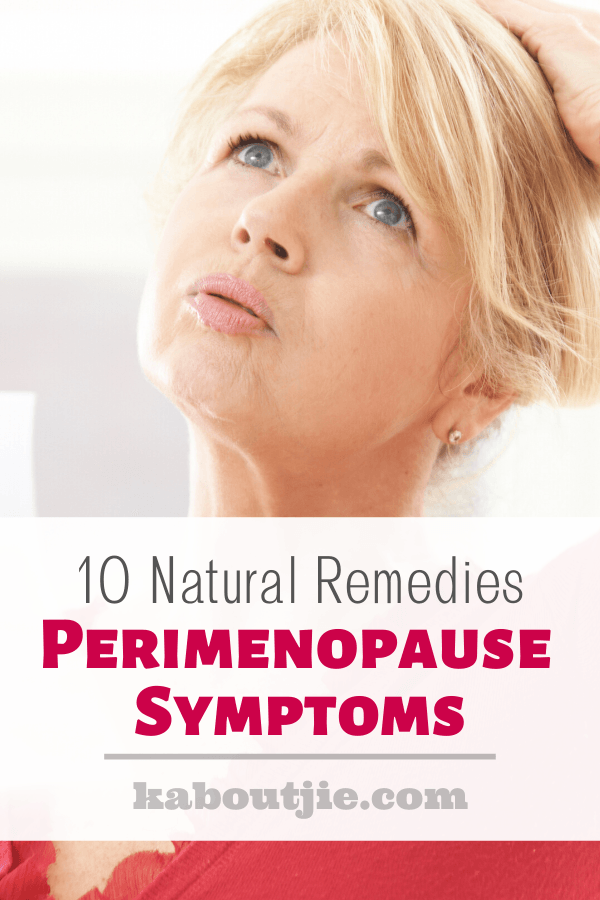Perimenopause happens when your body starts producing less estrogen. Your periods start to fluctuate when the ovaries produce a reduced amount of the estrogen hormone and you may even skip periods. Eventually when your body goes into menopause, your monthly cycle will stop all together.
Once you’ve gone without your monthly cycle for a year, it means that your body has reached full menopause. This occurs round about the age of 51 for the average women. Symptoms of perimenopause can last anything from a few months to a few years.
***Disclosure -The links in this post may contain affiliate links and I may receive a small commission if you make a purchase after clicking on a link.***
fhormon
Symptoms Of Perimenopause May Include:
- Hot flashes
- Irregular periods
- Vaginal dryness
- Difficulty sleeping
- Slowing down of your metabolism
- Decreased sex drive
The symptoms are treatable with prescription hormone replacements but you can also try some of these natural home remedies for perimenopause symptoms.
- Ginseng
You can either brew ground ginseng root into a tea or it can be taken in capsule form, which is readily available from most supermarkets, drug stores or online. Asian countries have been using Ginseng as a sedative for ages. Although it has not been scientifically proven as an effective treatment for hot flashes, the soothing properties of ginseng can be a helpful aid in improving the duration and quality of your sleep cycles.

- Black cohosh
Not only are the herbs of this native herb of North America grounded to be utilised as a dietary supplement, it’s also a well-known remedy used for menopause symptoms. One analysis of a placebo-controlled study involved with black cohosh indicated that it is a helpful aid for relief of menopause symptoms.
- Soy
Including more soy into your diet may help with menopause symptoms. Soy contains isoflavones which is plant-based estrogen that can help with boosting estrogen levels which is now decreased due to perimenopause or menopause symptoms. This natural remedy can help with improving night sweats, hot flashes and even vaginal dryness. The best examples of soy products to include in your eating plan are edamame, soy milk, soybeans and tofu or you can buy soybean extract for treatment of these symptoms.
- Wild yam
Wild yam supplements can help with mimicking the effects that estrogen has on your body. Researchers are conducting studies to determine whether plant extracts such as red yam can help with treatment of perimenopause symptoms. Currents studies reveals that wild yam is not as effective as other natural remedies but if you are looking to incorporate this botanical as a natural aid, you can apply a topical cream which contains wild yam or you can take it in pill form.
- Vitamin D
Once your ovaries cease to produce estrogen, you are at a higher risk of developing osteoporosis. Taking a vitamin D supplement may not improve menopause symptoms such as vaginal dryness or hot flashes but it can help with making your bones stronger. Vitamin D is also known for stabilizing emotions and assisting with self-perception due to the positive effects it has in boosting your mood.
- Yoga exercises
Yoga exercises is a popular practice used by many women for improving mood swings, hot flashes and insomnia as a result of menopause. Studies revealed that yoga can assist with promoting better sleep and stabilising your mood when you’re going through perimenopause.

- French maritime pine bark extract
Pine bark extract, also known as Pycnogenol is available for purchase at health food stores. It is an extract which is made from organic chemicals called flavonoids and plant-based hormones. Studies have shown that Pycnogenol which was taken for a period of four weeks has had a considerable effect on improving hot flashes and other symptoms.
- Dong quai
Dong quai is a traditional Chinese medicine. The root of the plant is used in a tea, as an extract or as a tincture. The advantages of using dong quai for the relief of perimenopause symptoms are unclear but women reported feeling better after they started using this natural treatment. You can make tea from dong quai teabags or take an herbal dong quai supplement.
- Kava
There is no evidence that Kava helps with hot flashes, however it may help with decreasing feelings of anxiety. It should be noted that the FDA has issued a warning to patients and suppliers about the use of kava due to the potential damage it can cause to the liver. Therefore, it is not recommended to use this long-term.

- Evening Primrose Oil
This botanical is recommended for relieving hot flashes. However, evening primrose oil must not be used with phenothiazines (some type of psychotherapeutic agent) or anticoagulants. It has been reported to induce seizures in individuals who are diagnosed with schizophrenia or patients that are taking antipsychotic medication. Some of the side effects associated with evening primrose oil include problems with the immune system and blood clotting, inflammation, diarrhoea and nausea.
Risks and complications
As with any other therapies, there are always certain risks involved. Most people take herbal remedies in pill form as a supplement and not as a preparation which was made by a trained herbalist.
It should be acknowledged that herbal supplements are not regulated by the FDA as the case is with prescription drugs. Dosages, quality, safety and purity are all factors that are varied when it comes to herbal therapies.
Some herbal therapies may interact undesirable with prescription drugs that can have an effect on the effectiveness of the drug or botanical, or both. Soy products, for instance, can interact with synthetic estrogen and antidepressants and may lead to other health issues. Taking too much Ginseng can lead to headaches and insomnia if you do not take it correctly.
If you consider taking natural remedies for perimenopause symptoms, don’t try them all at once. Rather try one at a time to see if they are providing relief.
It is recommended to speak to your healthcare provider if you are planning on taking herbal remedies and they should be stopped at least two weeks before undergoing any planned surgical procedures.
More research is needed to get an understanding of which natural remedies are most effective, however, some treatments are helping with keeping hot flashes and night sweats at bay.
Speak to your doctor if your perimenopause symptoms have an adverse effect on your quality of life, relationships or sleep patterns. If natural remedies for perimenopause symptoms is not providing relief, then you may opt for traditional menopause treatments or synthetic estrogen.
 Kaboutjie SA Mommy Blogs by Lynne Huysamen
Kaboutjie SA Mommy Blogs by Lynne Huysamen




